Nursing Leadership: Policy Influence, Challenges and Implementation
VerifiedAdded on 2023/06/04
|6
|1489
|336
Essay
AI Summary
This essay discusses the pivotal role of registered nurses in shaping healthcare policies and improving patient care. It emphasizes the importance of nurse advocacy in policy formulation, particularly in areas like hand hygiene. The essay identifies challenges in policy implementation, such as resistance from nurses and varying educational backgrounds. It proposes strategies for effective implementation, including educating tenured nurses, conducting workshops for new nurses, and creating incentives for policy compliance. The essay concludes by highlighting how nurse leaders can overcome these challenges and improve healthcare outcomes. Desklib provides this essay as a valuable resource, offering students access to solved assignments and past papers for enhanced learning.
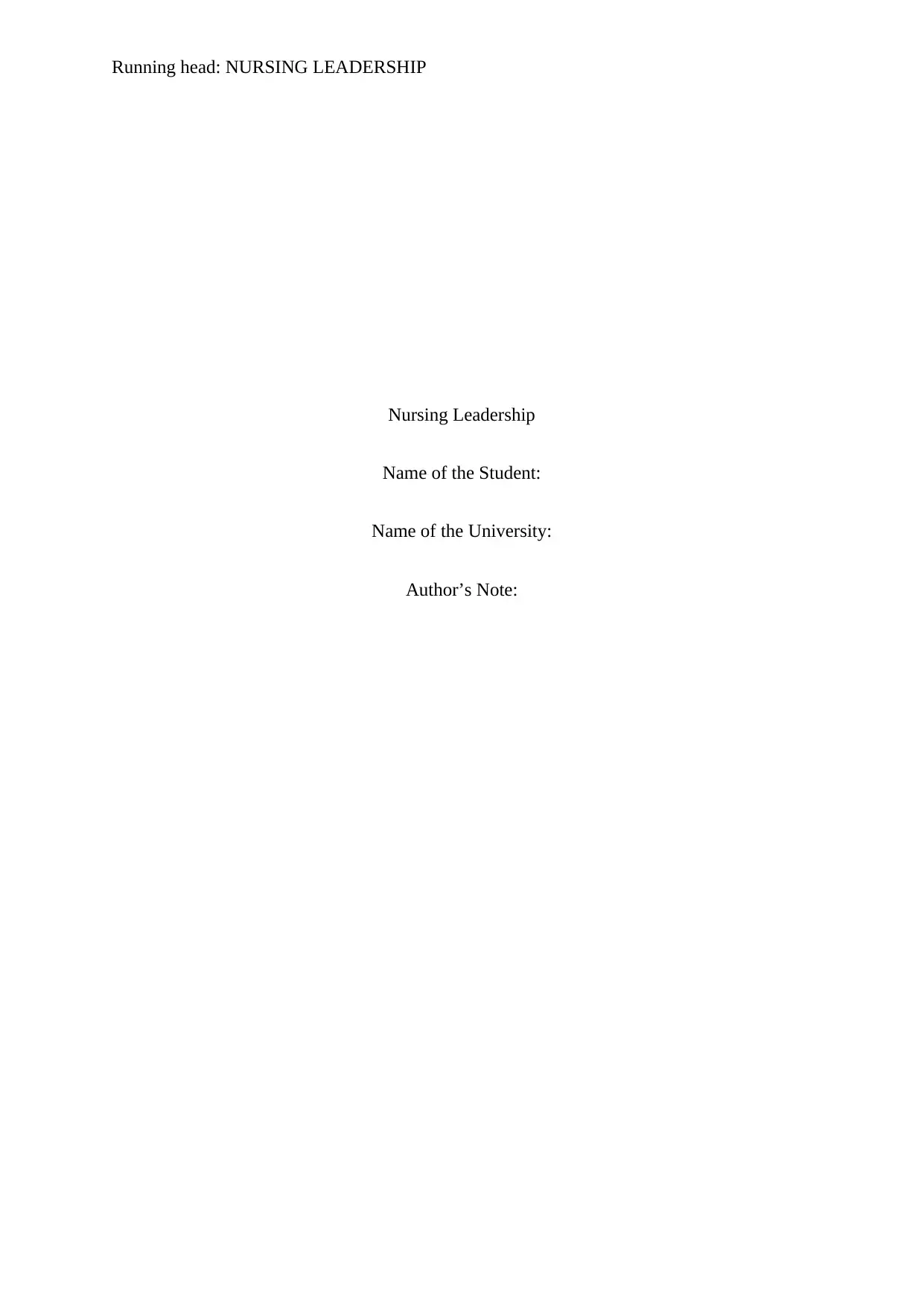
Running head: NURSING LEADERSHIP
Nursing Leadership
Name of the Student:
Name of the University:
Author’s Note:
Nursing Leadership
Name of the Student:
Name of the University:
Author’s Note:
Paraphrase This Document
Need a fresh take? Get an instant paraphrase of this document with our AI Paraphraser
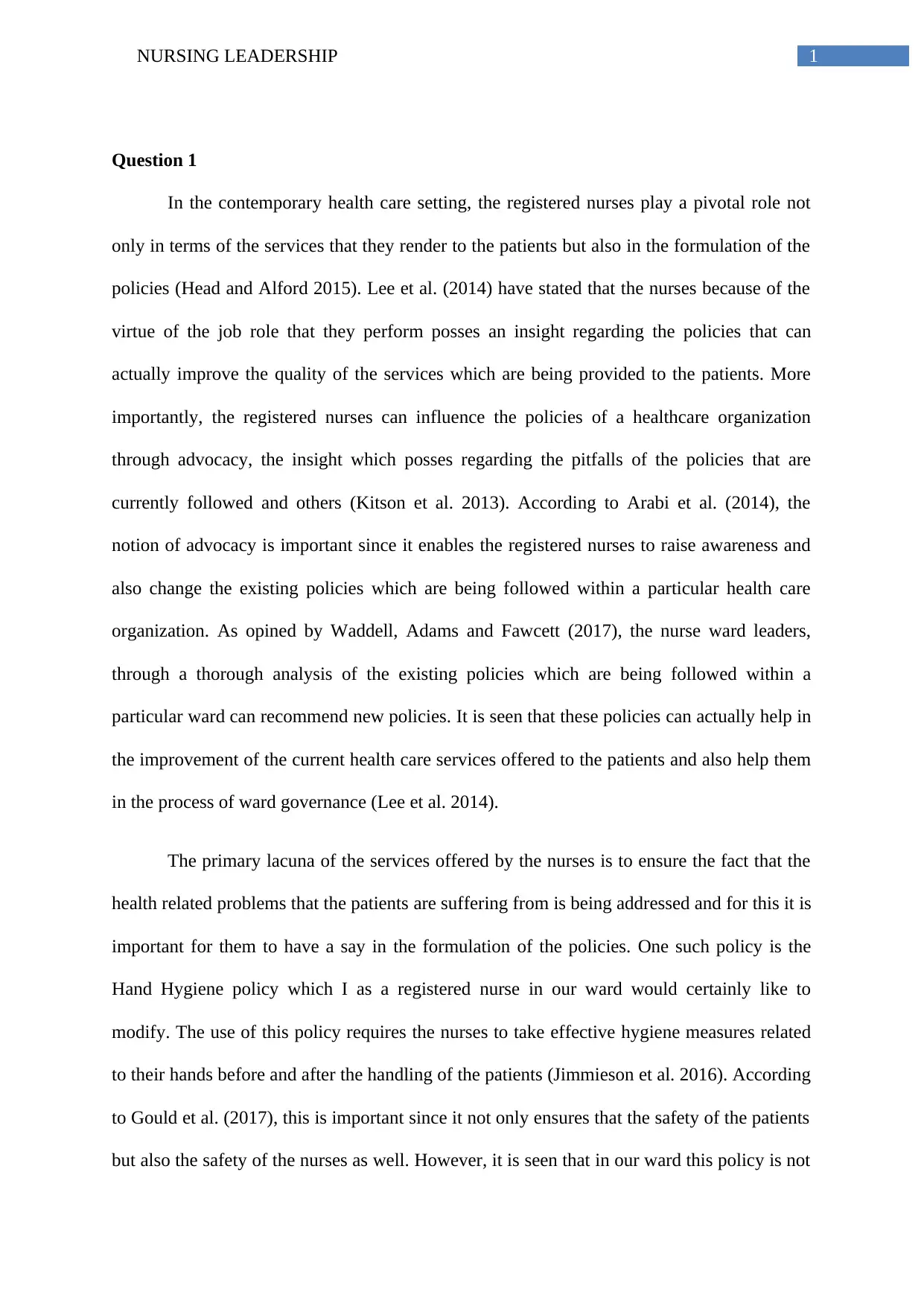
1NURSING LEADERSHIP
Question 1
In the contemporary health care setting, the registered nurses play a pivotal role not
only in terms of the services that they render to the patients but also in the formulation of the
policies (Head and Alford 2015). Lee et al. (2014) have stated that the nurses because of the
virtue of the job role that they perform posses an insight regarding the policies that can
actually improve the quality of the services which are being provided to the patients. More
importantly, the registered nurses can influence the policies of a healthcare organization
through advocacy, the insight which posses regarding the pitfalls of the policies that are
currently followed and others (Kitson et al. 2013). According to Arabi et al. (2014), the
notion of advocacy is important since it enables the registered nurses to raise awareness and
also change the existing policies which are being followed within a particular health care
organization. As opined by Waddell, Adams and Fawcett (2017), the nurse ward leaders,
through a thorough analysis of the existing policies which are being followed within a
particular ward can recommend new policies. It is seen that these policies can actually help in
the improvement of the current health care services offered to the patients and also help them
in the process of ward governance (Lee et al. 2014).
The primary lacuna of the services offered by the nurses is to ensure the fact that the
health related problems that the patients are suffering from is being addressed and for this it is
important for them to have a say in the formulation of the policies. One such policy is the
Hand Hygiene policy which I as a registered nurse in our ward would certainly like to
modify. The use of this policy requires the nurses to take effective hygiene measures related
to their hands before and after the handling of the patients (Jimmieson et al. 2016). According
to Gould et al. (2017), this is important since it not only ensures that the safety of the patients
but also the safety of the nurses as well. However, it is seen that in our ward this policy is not
Question 1
In the contemporary health care setting, the registered nurses play a pivotal role not
only in terms of the services that they render to the patients but also in the formulation of the
policies (Head and Alford 2015). Lee et al. (2014) have stated that the nurses because of the
virtue of the job role that they perform posses an insight regarding the policies that can
actually improve the quality of the services which are being provided to the patients. More
importantly, the registered nurses can influence the policies of a healthcare organization
through advocacy, the insight which posses regarding the pitfalls of the policies that are
currently followed and others (Kitson et al. 2013). According to Arabi et al. (2014), the
notion of advocacy is important since it enables the registered nurses to raise awareness and
also change the existing policies which are being followed within a particular health care
organization. As opined by Waddell, Adams and Fawcett (2017), the nurse ward leaders,
through a thorough analysis of the existing policies which are being followed within a
particular ward can recommend new policies. It is seen that these policies can actually help in
the improvement of the current health care services offered to the patients and also help them
in the process of ward governance (Lee et al. 2014).
The primary lacuna of the services offered by the nurses is to ensure the fact that the
health related problems that the patients are suffering from is being addressed and for this it is
important for them to have a say in the formulation of the policies. One such policy is the
Hand Hygiene policy which I as a registered nurse in our ward would certainly like to
modify. The use of this policy requires the nurses to take effective hygiene measures related
to their hands before and after the handling of the patients (Jimmieson et al. 2016). According
to Gould et al. (2017), this is important since it not only ensures that the safety of the patients
but also the safety of the nurses as well. However, it is seen that in our ward this policy is not
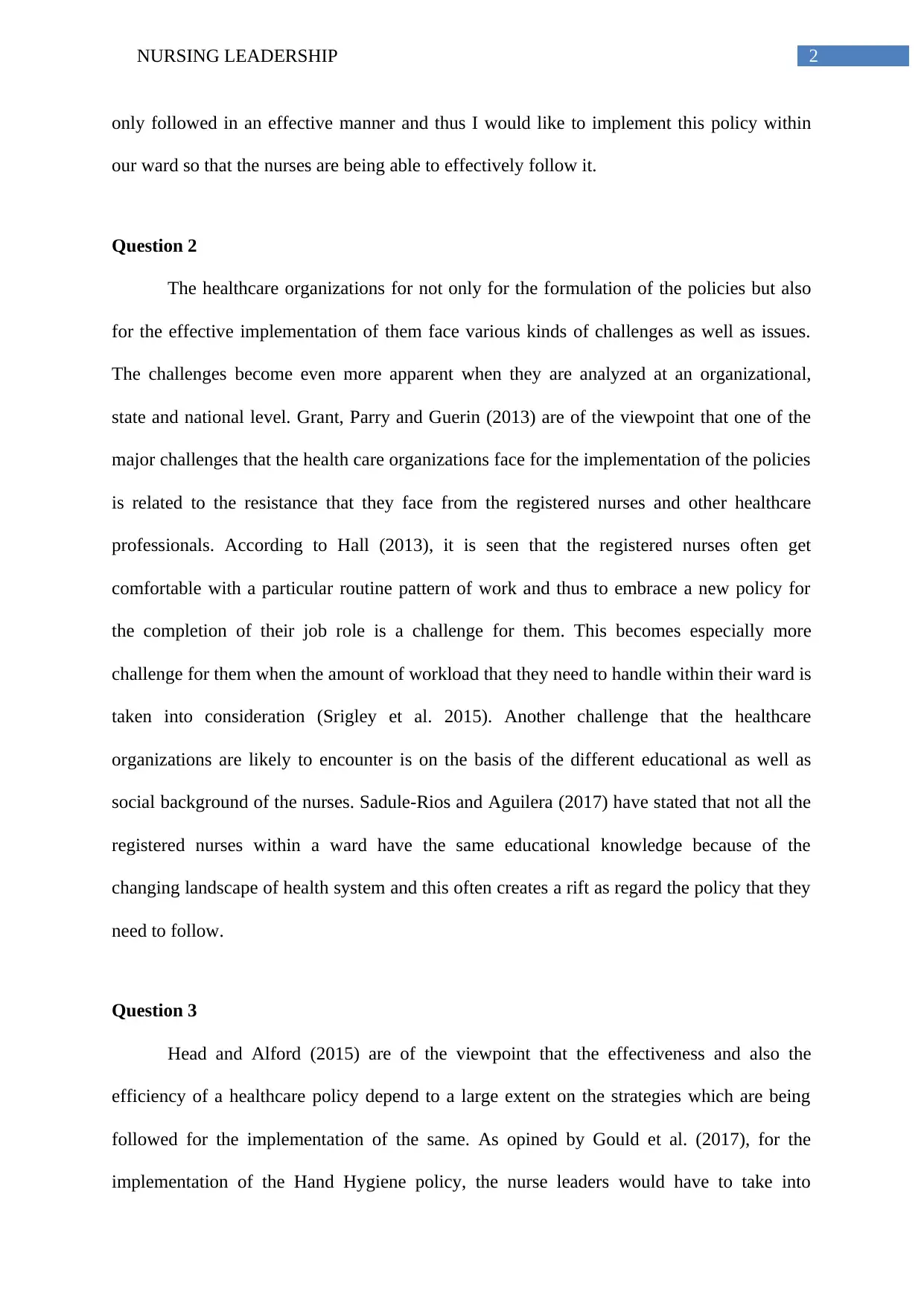
2NURSING LEADERSHIP
only followed in an effective manner and thus I would like to implement this policy within
our ward so that the nurses are being able to effectively follow it.
Question 2
The healthcare organizations for not only for the formulation of the policies but also
for the effective implementation of them face various kinds of challenges as well as issues.
The challenges become even more apparent when they are analyzed at an organizational,
state and national level. Grant, Parry and Guerin (2013) are of the viewpoint that one of the
major challenges that the health care organizations face for the implementation of the policies
is related to the resistance that they face from the registered nurses and other healthcare
professionals. According to Hall (2013), it is seen that the registered nurses often get
comfortable with a particular routine pattern of work and thus to embrace a new policy for
the completion of their job role is a challenge for them. This becomes especially more
challenge for them when the amount of workload that they need to handle within their ward is
taken into consideration (Srigley et al. 2015). Another challenge that the healthcare
organizations are likely to encounter is on the basis of the different educational as well as
social background of the nurses. Sadule-Rios and Aguilera (2017) have stated that not all the
registered nurses within a ward have the same educational knowledge because of the
changing landscape of health system and this often creates a rift as regard the policy that they
need to follow.
Question 3
Head and Alford (2015) are of the viewpoint that the effectiveness and also the
efficiency of a healthcare policy depend to a large extent on the strategies which are being
followed for the implementation of the same. As opined by Gould et al. (2017), for the
implementation of the Hand Hygiene policy, the nurse leaders would have to take into
only followed in an effective manner and thus I would like to implement this policy within
our ward so that the nurses are being able to effectively follow it.
Question 2
The healthcare organizations for not only for the formulation of the policies but also
for the effective implementation of them face various kinds of challenges as well as issues.
The challenges become even more apparent when they are analyzed at an organizational,
state and national level. Grant, Parry and Guerin (2013) are of the viewpoint that one of the
major challenges that the health care organizations face for the implementation of the policies
is related to the resistance that they face from the registered nurses and other healthcare
professionals. According to Hall (2013), it is seen that the registered nurses often get
comfortable with a particular routine pattern of work and thus to embrace a new policy for
the completion of their job role is a challenge for them. This becomes especially more
challenge for them when the amount of workload that they need to handle within their ward is
taken into consideration (Srigley et al. 2015). Another challenge that the healthcare
organizations are likely to encounter is on the basis of the different educational as well as
social background of the nurses. Sadule-Rios and Aguilera (2017) have stated that not all the
registered nurses within a ward have the same educational knowledge because of the
changing landscape of health system and this often creates a rift as regard the policy that they
need to follow.
Question 3
Head and Alford (2015) are of the viewpoint that the effectiveness and also the
efficiency of a healthcare policy depend to a large extent on the strategies which are being
followed for the implementation of the same. As opined by Gould et al. (2017), for the
implementation of the Hand Hygiene policy, the nurse leaders would have to take into
⊘ This is a preview!⊘
Do you want full access?
Subscribe today to unlock all pages.

Trusted by 1+ million students worldwide
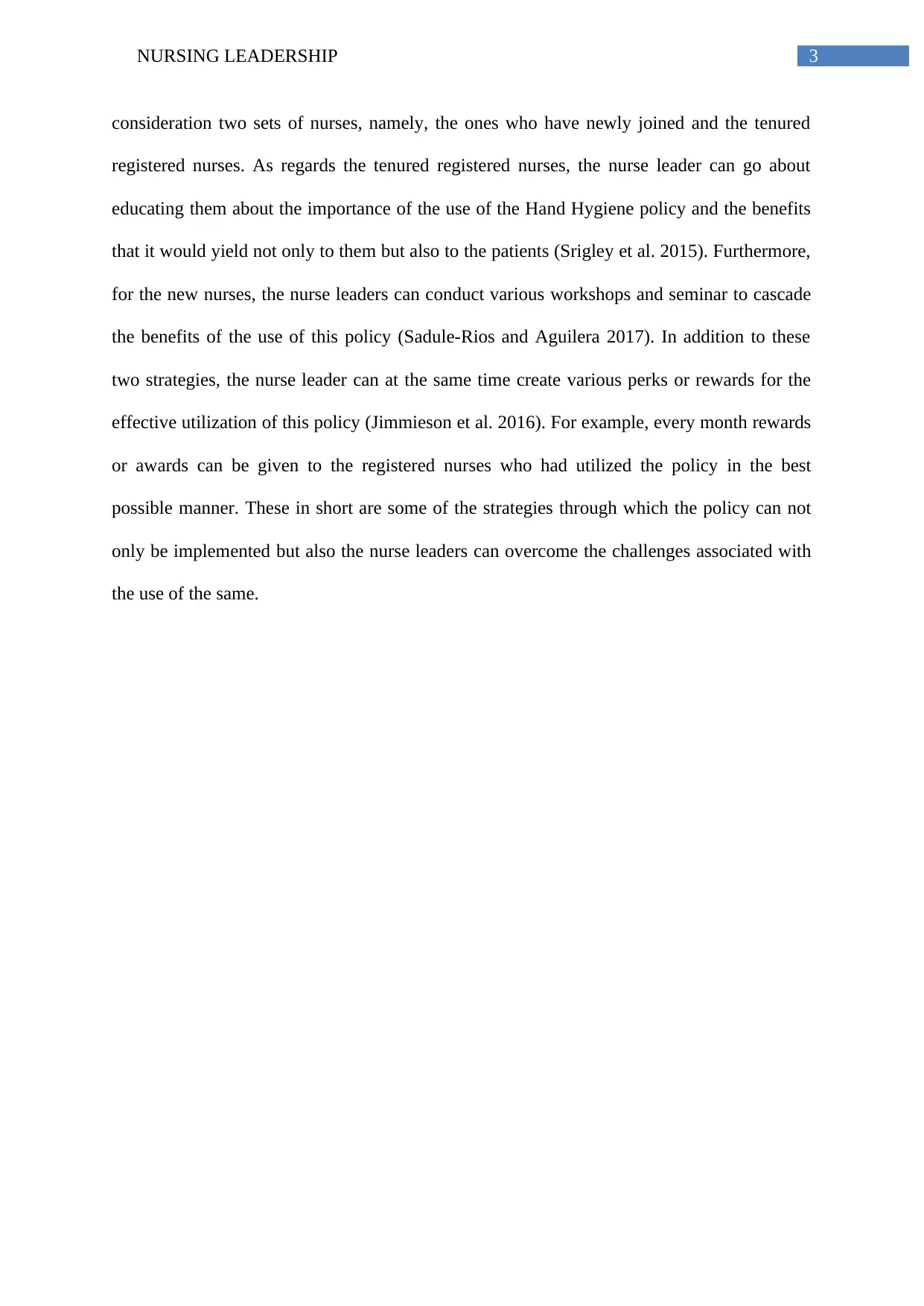
3NURSING LEADERSHIP
consideration two sets of nurses, namely, the ones who have newly joined and the tenured
registered nurses. As regards the tenured registered nurses, the nurse leader can go about
educating them about the importance of the use of the Hand Hygiene policy and the benefits
that it would yield not only to them but also to the patients (Srigley et al. 2015). Furthermore,
for the new nurses, the nurse leaders can conduct various workshops and seminar to cascade
the benefits of the use of this policy (Sadule-Rios and Aguilera 2017). In addition to these
two strategies, the nurse leader can at the same time create various perks or rewards for the
effective utilization of this policy (Jimmieson et al. 2016). For example, every month rewards
or awards can be given to the registered nurses who had utilized the policy in the best
possible manner. These in short are some of the strategies through which the policy can not
only be implemented but also the nurse leaders can overcome the challenges associated with
the use of the same.
consideration two sets of nurses, namely, the ones who have newly joined and the tenured
registered nurses. As regards the tenured registered nurses, the nurse leader can go about
educating them about the importance of the use of the Hand Hygiene policy and the benefits
that it would yield not only to them but also to the patients (Srigley et al. 2015). Furthermore,
for the new nurses, the nurse leaders can conduct various workshops and seminar to cascade
the benefits of the use of this policy (Sadule-Rios and Aguilera 2017). In addition to these
two strategies, the nurse leader can at the same time create various perks or rewards for the
effective utilization of this policy (Jimmieson et al. 2016). For example, every month rewards
or awards can be given to the registered nurses who had utilized the policy in the best
possible manner. These in short are some of the strategies through which the policy can not
only be implemented but also the nurse leaders can overcome the challenges associated with
the use of the same.
Paraphrase This Document
Need a fresh take? Get an instant paraphrase of this document with our AI Paraphraser
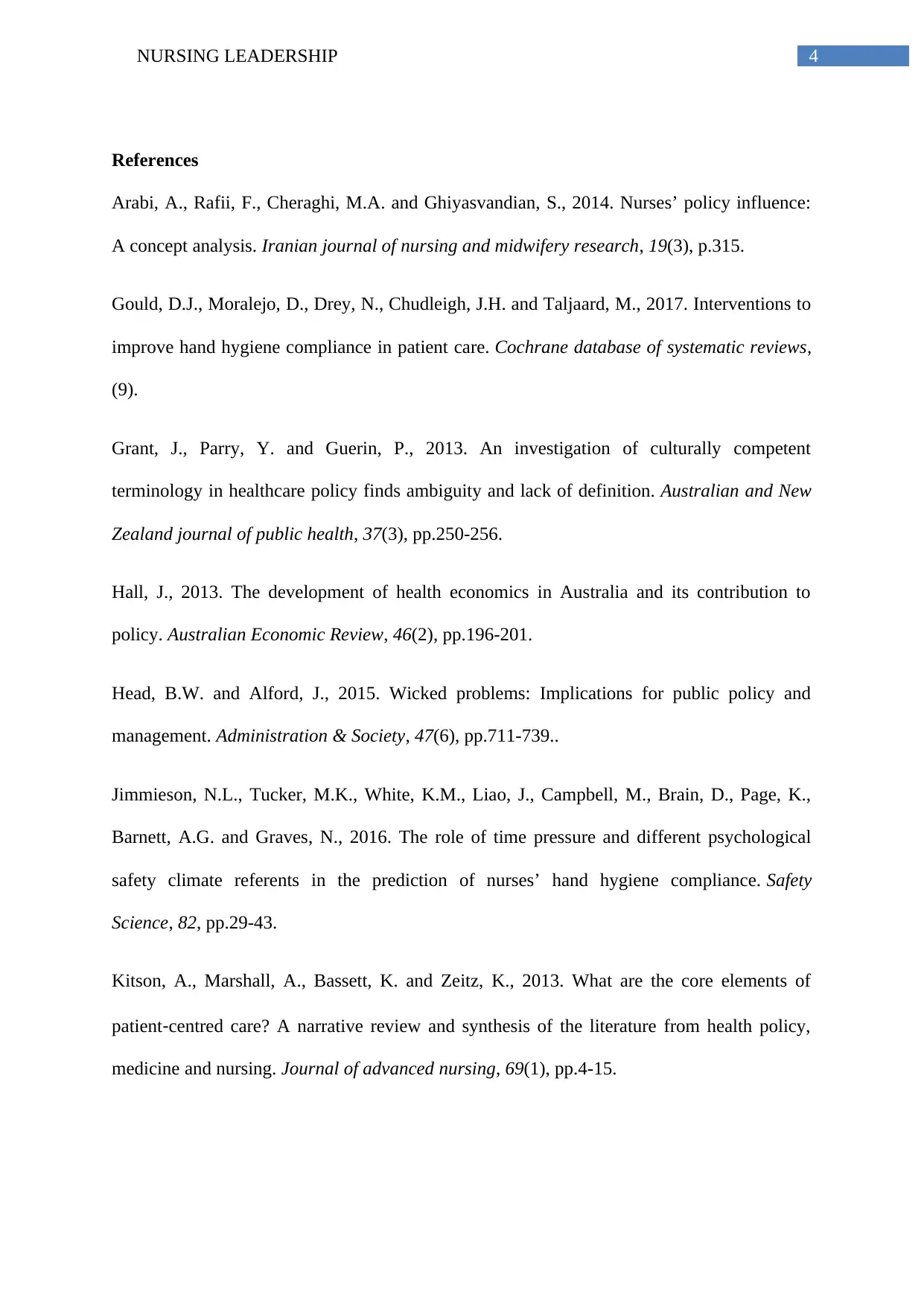
4NURSING LEADERSHIP
References
Arabi, A., Rafii, F., Cheraghi, M.A. and Ghiyasvandian, S., 2014. Nurses’ policy influence:
A concept analysis. Iranian journal of nursing and midwifery research, 19(3), p.315.
Gould, D.J., Moralejo, D., Drey, N., Chudleigh, J.H. and Taljaard, M., 2017. Interventions to
improve hand hygiene compliance in patient care. Cochrane database of systematic reviews,
(9).
Grant, J., Parry, Y. and Guerin, P., 2013. An investigation of culturally competent
terminology in healthcare policy finds ambiguity and lack of definition. Australian and New
Zealand journal of public health, 37(3), pp.250-256.
Hall, J., 2013. The development of health economics in Australia and its contribution to
policy. Australian Economic Review, 46(2), pp.196-201.
Head, B.W. and Alford, J., 2015. Wicked problems: Implications for public policy and
management. Administration & Society, 47(6), pp.711-739..
Jimmieson, N.L., Tucker, M.K., White, K.M., Liao, J., Campbell, M., Brain, D., Page, K.,
Barnett, A.G. and Graves, N., 2016. The role of time pressure and different psychological
safety climate referents in the prediction of nurses’ hand hygiene compliance. Safety
Science, 82, pp.29-43.
Kitson, A., Marshall, A., Bassett, K. and Zeitz, K., 2013. What are the core elements of
patient‐centred care? A narrative review and synthesis of the literature from health policy,
medicine and nursing. Journal of advanced nursing, 69(1), pp.4-15.
References
Arabi, A., Rafii, F., Cheraghi, M.A. and Ghiyasvandian, S., 2014. Nurses’ policy influence:
A concept analysis. Iranian journal of nursing and midwifery research, 19(3), p.315.
Gould, D.J., Moralejo, D., Drey, N., Chudleigh, J.H. and Taljaard, M., 2017. Interventions to
improve hand hygiene compliance in patient care. Cochrane database of systematic reviews,
(9).
Grant, J., Parry, Y. and Guerin, P., 2013. An investigation of culturally competent
terminology in healthcare policy finds ambiguity and lack of definition. Australian and New
Zealand journal of public health, 37(3), pp.250-256.
Hall, J., 2013. The development of health economics in Australia and its contribution to
policy. Australian Economic Review, 46(2), pp.196-201.
Head, B.W. and Alford, J., 2015. Wicked problems: Implications for public policy and
management. Administration & Society, 47(6), pp.711-739..
Jimmieson, N.L., Tucker, M.K., White, K.M., Liao, J., Campbell, M., Brain, D., Page, K.,
Barnett, A.G. and Graves, N., 2016. The role of time pressure and different psychological
safety climate referents in the prediction of nurses’ hand hygiene compliance. Safety
Science, 82, pp.29-43.
Kitson, A., Marshall, A., Bassett, K. and Zeitz, K., 2013. What are the core elements of
patient‐centred care? A narrative review and synthesis of the literature from health policy,
medicine and nursing. Journal of advanced nursing, 69(1), pp.4-15.
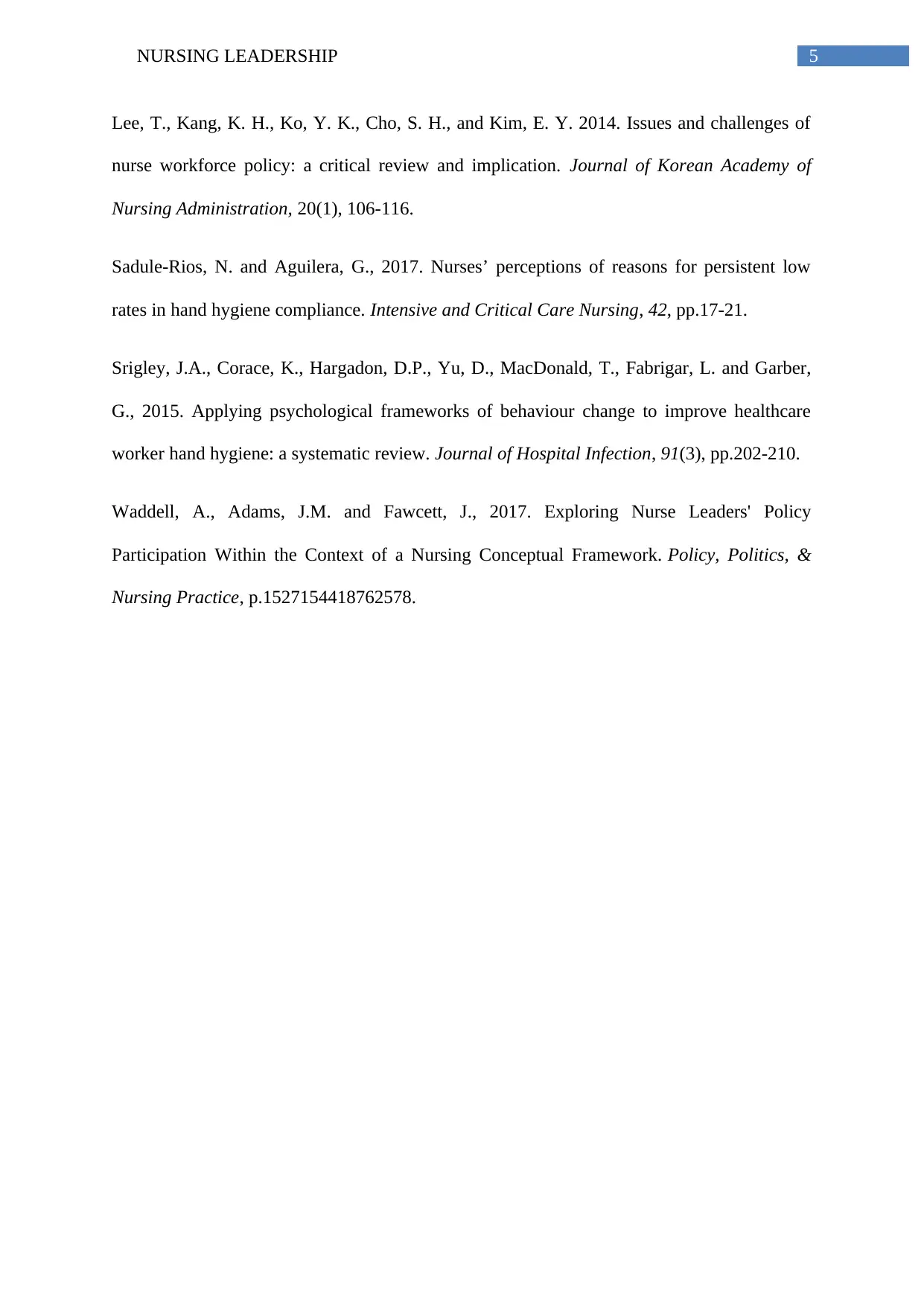
5NURSING LEADERSHIP
Lee, T., Kang, K. H., Ko, Y. K., Cho, S. H., and Kim, E. Y. 2014. Issues and challenges of
nurse workforce policy: a critical review and implication. Journal of Korean Academy of
Nursing Administration, 20(1), 106-116.
Sadule-Rios, N. and Aguilera, G., 2017. Nurses’ perceptions of reasons for persistent low
rates in hand hygiene compliance. Intensive and Critical Care Nursing, 42, pp.17-21.
Srigley, J.A., Corace, K., Hargadon, D.P., Yu, D., MacDonald, T., Fabrigar, L. and Garber,
G., 2015. Applying psychological frameworks of behaviour change to improve healthcare
worker hand hygiene: a systematic review. Journal of Hospital Infection, 91(3), pp.202-210.
Waddell, A., Adams, J.M. and Fawcett, J., 2017. Exploring Nurse Leaders' Policy
Participation Within the Context of a Nursing Conceptual Framework. Policy, Politics, &
Nursing Practice, p.1527154418762578.
Lee, T., Kang, K. H., Ko, Y. K., Cho, S. H., and Kim, E. Y. 2014. Issues and challenges of
nurse workforce policy: a critical review and implication. Journal of Korean Academy of
Nursing Administration, 20(1), 106-116.
Sadule-Rios, N. and Aguilera, G., 2017. Nurses’ perceptions of reasons for persistent low
rates in hand hygiene compliance. Intensive and Critical Care Nursing, 42, pp.17-21.
Srigley, J.A., Corace, K., Hargadon, D.P., Yu, D., MacDonald, T., Fabrigar, L. and Garber,
G., 2015. Applying psychological frameworks of behaviour change to improve healthcare
worker hand hygiene: a systematic review. Journal of Hospital Infection, 91(3), pp.202-210.
Waddell, A., Adams, J.M. and Fawcett, J., 2017. Exploring Nurse Leaders' Policy
Participation Within the Context of a Nursing Conceptual Framework. Policy, Politics, &
Nursing Practice, p.1527154418762578.
⊘ This is a preview!⊘
Do you want full access?
Subscribe today to unlock all pages.

Trusted by 1+ million students worldwide
1 out of 6
Related Documents
Your All-in-One AI-Powered Toolkit for Academic Success.
+13062052269
info@desklib.com
Available 24*7 on WhatsApp / Email
![[object Object]](/_next/static/media/star-bottom.7253800d.svg)
Unlock your academic potential
Copyright © 2020–2026 A2Z Services. All Rights Reserved. Developed and managed by ZUCOL.





